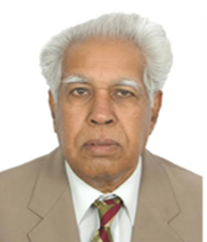Article begins
1937–2022
Our dear colleague and friend Professor Hari Mohan Mathur, the doyen of resettlement and development anthropology in India, recently passed away at the age of 85. We are saddened at his demise, but also grateful for his contributions to the social science of development and involuntary resettlement.
Hari Mohan was an amazing scholar, a great soul, and a very humble person for someone with such a long and distinguished career. He graduated with an MA in Anthropology (1958) from Lucknow University and taught for a year at Lucknow prior to joining the Indian Administrative Service (IAS) in 1959. He later earned his PhD from the University of Rajasthan.
Hari Mohan served in many senior positions of the government, including as chief secretary to the government of Rajasthan. He was also vice chancellor of the University of Rajasthan. In 2006, he was named distinguished professor at the Council for Social Development, New Delhi. He artfully and effectively interlocked his scholarly and administrative work over a period of almost 50 years, aimed at promoting development and social change, and advocated for social equity through policy and action.
I first met Hari Mohan in June 1990 at the World Bank Training and Orientation Meetings for consultants held in Washington, DC. Since then, we met several times in places such as Bhubaneswar, Calcutta, Dhaka, Delhi, and Manila. I recall hosting a reception for him in Dhaka in 2002 where he happily met many Bangladeshi colleagues/consultants over dinner. On nearly every single trip to New Delhi, I had meals with Hari Mohan at the India International Center in Lodhi Gardens. It was such a joy to be with him.
A strong believer in the role of social science in development administration, his works and writings were policy-oriented and practical. He made major contributions through his numerous books to resettlement and social impact assessments in development projects. These, among many, include Anthropology in the Development Process (1975), Administering Development in the Third World (1986), Development, Displacement, and Resettlement: Focus on Asian Experience (1995), Development Projects and Impoverishment Risks (coedited with David Marsden, 1998), India: Social Development Report 2008 Development and Displacement (2008), Can Compensation Prevent Impoverishment? (coedited with Michael M. Cernea, 2008), and Assessing the Social Impact of Development Projects: Experiences in India and Other Asian Countries (2016). I feel honored to have contributed chapters to four of his edited books.
Hari Mohan remained productive throughout his life. His latest edited book. Good Practices in Resettlement: An Approach to Improving Development Outcomes (2023), will be available soon. He single-handedly edited and published the only newsletter on resettlement―Resettlement News (RN)―for over 20 years (2000–2021) and finally handed over the responsibility of the RN to me before he passed away.
Hari Mohan lived a life full of passion with a purpose to educate us on development impacts and how to make it better while protecting those affected in the process. He thus earned respect among his peers for his knowledge as well as integrity and excellence that serve as an inspiration to all of us. Hari Mohan may have gone, but he will never be forgotten. He will always be remembered for his academic work and advocacy.

(Mohammad Zaman)
Cite as: Zaman, Mohammad. 2023. “Hari Mohan Mathur.” Anthropology News website, January 30, 2023.

